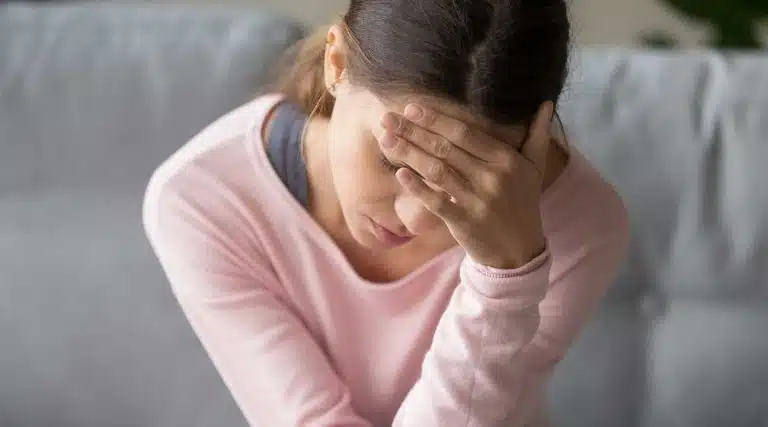Klonopin (Clonazepam) Withdrawal | Symptoms, Timeline, Taper, & Detox

Klonopin is a brand name benzodiazepine, also known as clonazepam. It’s commonly used to treat anxiety disorder, panic disorder, seizures, insomnia, and alcohol withdrawal. Although it’s beneficial for treating a variety of disorders, it has a high risk of dependence and addiction.
If you take Klonopin and want to stop, you should speak with your prescribing doctor about a gradual taper. Stopping Klonopin cold turkey can result in severe withdrawal syndrome that can last about a month.
Some people experience post-acute withdrawal and some symptoms linger for several months.
In severe cases, benzodiazepine withdrawal can be life-threatening. If you or a loved one is experiencing severe withdrawal symptoms, seek emergency help immediately.
How Klonopin Works
Clonazepam is a benzodiazepine and central nervous system depressant that increases the neurotransmitter gamma-aminobutyric acid (GABA) in the brain. This causes calmness, relaxation, and in high doses, euphoria.
Other common benzodiazepine drugs include:
- Ativan
- Xanax
- Valium
Along with its pleasurable effects, clonazepam has many common side effects similar to other benzos. These side effects can vary in intensity depending on how high your dose is and how frequently you take your medication.
Side effects of clonazepam may include:
- drowsiness
- coordination problems
- dizziness
- memory problems
Klonopin Withdrawal Timeline
If you take clonazepam for more than a few weeks, you could become physically dependent. When you’re dependent, your body needs them to function or you could experience benzodiazepine withdrawal syndrome.
These factors can influence the duration and intensity of withdrawal:
- strength of dose
- frequency of dose
- age
- health
- weight
- co-occurring drug abuse, especially with alcohol or barbiturates
Early Withdrawal
Clonazepam has a long half-life compared to other benzodiazepines, which prolongs the onset of withdrawal symptoms. You may not feel any symptoms until 24-48 hours after your last dose.
Symptoms of Klonopin withdrawal include:
- increase in blood pressure and pulse
- anxiety
- panic attacks
- restlessness
- nausea
Rebound Insomnia/Rebound Anxiety
When you first stop taking clonazepam, you may also start to experience anxiety or insomnia that is worse than when you first started taking the medication. Rebound insomnia and anxiety should fade after the first few days of withdrawal.
These symptoms usually peak after 72 hours but may continue for several days.
Acute Withdrawal
Your symptoms will peak during the next two weeks but may last about a month. You may also start to experience additional symptoms.
Symptoms of Klonopin withdrawal include:
- tremors
- fever
- sweating
- diarrhea
- insomnia
- anxiety
- depression
Post-Acute Withdrawal Syndrome (PAWS)
Although most of your symptoms should start to decrease after two weeks, you may continue to feel some effects long after you stop taking Klonopin. Known as post-acute withdrawal, these symptoms can last anywhere from months to years.
Post-acute withdrawal symptoms may include:
- insomnia
- anxiety
- depression
- cravings
These symptoms make it difficult to remain abstinent from benzos and other prescription drugs. To prevent relapse, be sure to seek counseling or long-term addiction treatment to learn how to cope with these uncomfortable feelings.
Dangerous Symptoms Of Withdrawal
Severe and life-threatening symptoms can appear within the first month in some cases, especially if you were taking high doses of clonazepam.
If you experience any of these symptoms, seek help immediately:
- seizures
- hallucinations
- delirium
- agitation
- dysautonomia (the autonomic nervous system cannot function properly)
- changes in consciousness
- death
Benzodiazepine Addiction Treatment Options
Addiction and dependence to benzodiazepines is a serious concern and should never be addressed without medical supervision. Even if you are prescribed Klonopin, you could become dependent and eventually develop a substance use disorder (SUD).
There are many treatment programs available that can help wean you off of Klonopin safely. However, addiction is a chronic disease that requires long-term comprehensive treatment.
If you or a loved one is addicted, it’s recommended to consider behavioral therapy and other addiction treatment programs.
Klonopin Taper
Your doctor can taper you off your prescription by gradually decreasing your dose in small increments. Tapering can take several weeks but it decreases the chance you will experience withdrawal symptoms.
Your doctor will evaluate you regularly and monitor your vital signs, such as heart rate, to ensure your body is adjusting properly. If anxiety or insomnia returns, they may recommend alternative treatments to help you cope.
Klonopin Detox
In medical detox, medical professionals will help you wean off clonazepam. During your stay, they will monitor your vital signs at least three times a day. They may give you medications, such as anticonvulsants if you experience any severe symptoms.
Behavioral Therapy
You can receive behavioral therapy in residential programs, inpatient rehab, and outpatient programs. Behavioral therapy is an important part of any addiction treatment program because it addresses triggers and behavioral patterns.
If you or a loved one is seeking treatment, please contact Ark Behavioral Health today.
Written by Ark Behavioral Health Editorial Team
©2024 Ark National Holdings, LLC. | All Rights Reserved.
This page does not provide medical advice.
DailyMed - Klonopin, Clonazepam Tablet
Federal Bureau of Prisons - Detoxification of Chemically Dependent Inmates
National Library of Medicine - Management of Benzodiazepine Misuse and Dependence
Society for the Study of Addiction - The Benzodiazepine Withdrawal Syndrome

Questions About Treatment?
Ark Behavioral Health offers 100% confidential substance abuse assessment and treatment placement tailored to your individual needs. Achieve long-term recovery.
100% confidential. We respect your privacy.
Prefer Texting?
Our friendly support team is here to chat 24/7. Opt out any time.







 Learn More
Learn More








